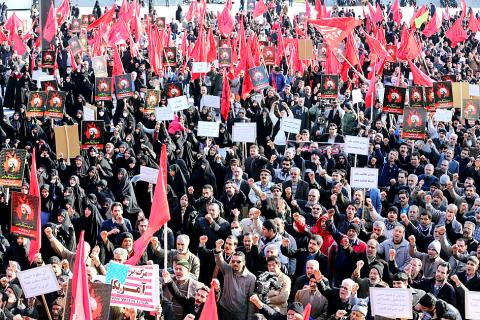Bahrain joined Saudi Arabia in severing ties with Iran in the biggest meltdown in relations between the Middle Eastern powers in almost three decades, raising the specter of deepening conflicts across the volatile region.
The Saudi government gave Iran’s ambassador 48 hours to leave after protesters set its embassy in Tehran on fire on Sunday following the execution of Saudi cleric Nimr al-Nimr, a critic of the kingdom’s treatment of its Shiite minority.
Bahrain, a staunch Saudi ally, yesterday said that it also broke off relations.

Photo: AFP
There had been scattered protests by demonstrators in the majority Shiite nation after al-Nimr’s execution.
The clash between the sectarian rivals exposes again the fault lines in the tinderbox region and risks worsening conflicts in Yemen and Syria, where Sunni-dominated Saudi Arabia and Shiite Iran are fighting proxy wars.
The expulsion of the Iranian diplomats came with an escalation in the war of words between the two countries. Saudi Arabia has been critical of a US-led deal last year with Iran over its nuclear program.
Saudi Foreign Minister Adel al-Jubeir, who announced the decision to eject the Iranians, late on Sunday said in Riyadh that his people would no longer deal with “a country that supports terrorism and sectarianism.”
Iranian Supreme Leader Ayatollah Ali Khamenei had said earlier that Saudi rulers would face repercussions for the execution of the Shiite cleric and that “the divine hand of revenge will take the Saudi politicians by the throat.”
Bahrain also gave the Iranian diplomatic mission 48 hours to leave the country, according to state-run Bahrain News Agency. The country also planned to close its mission in Tehran, the agency said.
The move came in response to Iran’s interference in Bahrain and other Gulf countries, the agency said. It accused Iran of funding, supporting and arming “terrorists and extremists” and inciting strife in the region.
The United Arab Emirates summoned Iran’s envoy, while Kuwait said it backed “all measures adopted by Saudi Arabia to maintain its security and stability,” according to an unnamed Ministry of Foreign Affairs official cited by the official Kuwaiti News Agency.
The standoff between Iran and Saudi Arabia is the biggest between the regional powers since the late 1980s, when the kingdom suspended ties with Iran after its embassy was attacked following the death of Iranian pilgrims during hajj in Mecca.
The latest clash is likely to undermine already-stumbling efforts to end the war in Syria, where Saudi Arabia backs largely Sunni militants and Iran supports Syrian President Bashar al-Assad.
Al-Nimr was a central figure in Arab Spring-inspired protests by Saudi Arabia’s Shiite minority until his arrest in 2012. He was convicted of terrorism charges, but denied advocating violence.
His family is holding three days of mourning at a mosque in al-Awamiya village in the kingdom’s al-Qatif region. The sheikh’s brother, Mohammed al-Nimr, told The Associated Press that Saudi officials informed his family that the cleric had been buried in an undisclosed cemetery.
Additional reporting by AP

AIR SUPPORT: The Ministry of National Defense thanked the US for the delivery, adding that it was an indicator of the White House’s commitment to the Taiwan Relations Act Deputy Minister of National Defense Po Horng-huei (柏鴻輝) and Representative to the US Alexander Yui on Friday attended a delivery ceremony for the first of Taiwan’s long-awaited 66 F-16C/D Block 70 jets at a Lockheed Martin Corp factory in Greenville, South Carolina. “We are so proud to be the global home of the F-16 and to support Taiwan’s air defense capabilities,” US Representative William Timmons wrote on X, alongside a photograph of Taiwanese and US officials at the event. The F-16C/D Block 70 jets Taiwan ordered have the same capabilities as aircraft that had been upgraded to F-16Vs. The batch of Lockheed Martin

GRIDLOCK: The National Fire Agency’s Special Search and Rescue team is on standby to travel to the countries to help out with the rescue effort A powerful earthquake rocked Myanmar and neighboring Thailand yesterday, killing at least three people in Bangkok and burying dozens when a high-rise building under construction collapsed. Footage shared on social media from Myanmar’s second-largest city showed widespread destruction, raising fears that many were trapped under the rubble or killed. The magnitude 7.7 earthquake, with an epicenter near Mandalay in Myanmar, struck at midday and was followed by a strong magnitude 6.4 aftershock. The extent of death, injury and destruction — especially in Myanmar, which is embroiled in a civil war and where information is tightly controlled at the best of times —

China's military today said it began joint army, navy and rocket force exercises around Taiwan to "serve as a stern warning and powerful deterrent against Taiwanese independence," calling President William Lai (賴清德) a "parasite." The exercises come after Lai called Beijing a "foreign hostile force" last month. More than 10 Chinese military ships approached close to Taiwan's 24 nautical mile (44.4km) contiguous zone this morning and Taiwan sent its own warships to respond, two senior Taiwanese officials said. Taiwan has not yet detected any live fire by the Chinese military so far, one of the officials said. The drills took place after US Secretary

THUGGISH BEHAVIOR: Encouraging people to report independence supporters is another intimidation tactic that threatens cross-strait peace, the state department said China setting up an online system for reporting “Taiwanese independence” advocates is an “irresponsible and reprehensible” act, a US government spokesperson said on Friday. “China’s call for private individuals to report on alleged ‘persecution or suppression’ by supposed ‘Taiwan independence henchmen and accomplices’ is irresponsible and reprehensible,” an unnamed US Department of State spokesperson told the Central News Agency in an e-mail. The move is part of Beijing’s “intimidation campaign” against Taiwan and its supporters, and is “threatening free speech around the world, destabilizing the Indo-Pacific region, and deliberately eroding the cross-strait status quo,” the spokesperson said. The Chinese Communist Party’s “threats